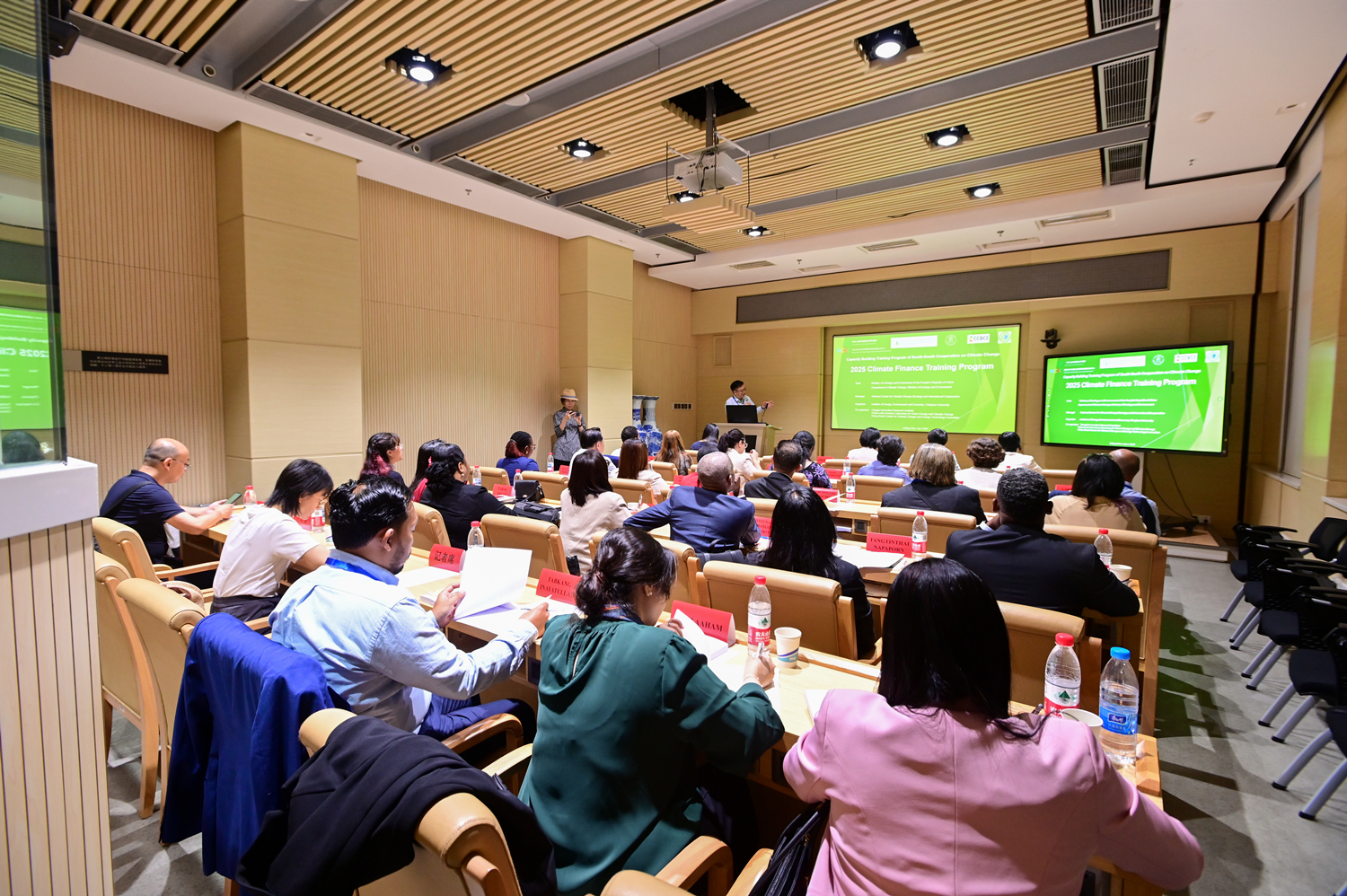On the morning of 1 September, the “South-South Cooperation 2025 Climate Finance Training Program” opened at Tsinghua University under the guidance of the Department of Climate Change, Ministry of Ecology and Environment of China, and organized by the Institute of Energy, Environment and Economy (3E) of Tsinghua,and co-organized by Tsinghua -UFRJ China-Brasil Center for Climate Change and Energy Technology Innovation, China-Latin America Joint Laboratory for Clean Energy and Climate Change and TSINGDA INNOVATION RESEARCH INSTITUTE. Twenty-eight senior government officials, technical experts and policy researchers from more than 14 developing countries across Asia, Africa, Latin America and the Pacific island nations gathered on campus for a 14-day intensive course on “climate finance and low-carbon transformation”.
Ms Hou Fang, Director of the General Affairs Division, Department of Climate Change, Ministry of Ecology and Environment, and Prof. Wang Haitao, Deputy Dean of the Institute of Nuclear and New Energy Technology (INET) of Tsinghua University, delivered opening remarks. The ceremony was chaired by Zhou Jian, Assistant Director of 3E. The trainee representatives—Ms Tangtinthai Napaporn (Director, Climate Finance and Investment Subdivision, Division of Strategy and International Cooperation, Department of Climate Change and Environment,Ministry of Natural Resources and Environment, Thailand), Ms De Arruda Nobre Maria Auxiliadora(Regulation Specialist, Brazilian Regulatory Agency of Petroleum, Natural Gas and Biofuels, Brazil) and Mr Laroussi Sofiane (Deputy Director, Economics and studies, Ministry of Energy, Mines and Renewable Energy, Algeria)—also addressed the audience.

Ms Hou Fang emphasized that China regards climate action as an intrinsic requirement for sustainable development.Green and low-carbon development has achieved remarkable results. The carbon market has been steadily advancing on a dual-track basis.Adaptation to climate change has been continuously advanced. Climate finance has achieved phased progress.“We hope this program will not only deepen friendship among participants but also foster substantive exchanges and pragmatic cooperation in global climate response,”she said. Prof. Wang Haitao noted that 3E has long supported national climate policy-making, while INET is leading the world in the development of High Temperature Gas-cooled Reactor (HTGR), one of the 4th generation nuclear systems. “Despite the diversity of nations and continents, I believe that you gather here by a shared mission: to promote management capacity and technology level in addressing climate change, green low-carbon development and climate finance. This is not merely an academic gathering, but a convergence of global minds determined to shape our collective future,” he added.
Structured around the theme of “climate finance”, the curriculum comprises five modules: China’s climate strategy and policy, international technology transfer, carbon-pricing mechanisms, domestic actions, and international experience. Through lectures, case studies and field visits, participants will gain a systematic understanding of China’s practices in green finance, carbon-market operation and renewable-energy investment mechanisms. During the program, they will also travel to Dongguan to examine demonstration projects in low-carbon industries and explore local innovations in climate finance.
During the remarks by student representatives, Ms. Tangtinthai Napaporn from Thailand stated that this training fostered the exchange of knowledge, experience, and resources among developing countries and laid a solid foundation for future cooperation. Ms. De Arruda Nobre Maria Auxiliadora from Brazil presented Brazil’s successful experience under the RenovaBio program in promoting biofuel development and carbon emission reductions, and expressed her eagerness to exchange views with China on carbon-market construction. Mr. Laroussi Sofiane from Algeria shared his country’s investment plans in natural-carbon-sink projects, combined-cycle power plants, and renewable-energy stations, noting that the workshop offers a rare opportunity for in-depth discussions on the critical role climate finance and investment play in achieving global climate goals.
Since 2019, 3E of Tsinghua has organized five editions of the Climate Finance Training Program, training about 140 officials and technical specialists from 39 developing and friendly countries and forming a global dialogue and cooperation network on climate change and finance. Through knowledge-sharing and capacity-building, the program has helped participants design national climate-finance strategies and implement concrete projects; several trainees have gone on to lead the development of climate-finance policies and practies in their home countries, becoming key drivers of South-South cooperation in global climate governance.
“As of now, China has signed 54 cooperation documents on South-South cooperation on climate change with 42 developing countries.We hope that this seminar will create an international dialogue platform, an academic exchange platform, and a technology financing cooperation platform, promoting the formation of a dialogue and cooperation network on climate investment and financing among the participants from various countries,” concluded Ms Hou Fang.